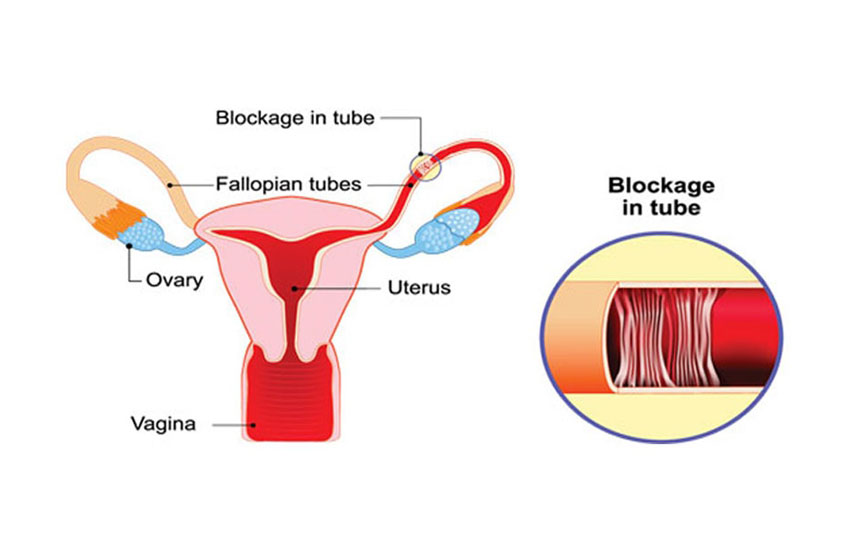• Blocked fallopian tubes are common cause of infertility. Sperm and an egg meet in the fallopian tube for fertilization. A blocked tube can prevent them from joining.
• If both tubes are fully blocked, pregnancy without treatment will be impossible. If the fallopian tubes are partially blocked, one can potentially get pregnant. However, the risk of an ectopic pregnancy increases.
• This is because it’s harder for a fertilized egg to move through a blockage to the uterus. Note: Ectopic pregnancy means pregnancy outside the womb. The conceptus may hang on the fallopian tube or cervix . Ectopic pregnancy may damage nearby organs and cause life-threatening loss of blood.
• Symptoms include pelvic pain and vaginal bleeding.
SYMPTOMS OF TUBAL BLOCKAGE:
• Blocked fallopian tubes don’t often cause symptoms. Many women don’t know they have blocked tubes until they try to get pregnant and have trouble.
• In some cases, blocked fallopian tubes can lead to mild, regular pain on one side of the abdomen. This usually happens in a type of blockage called hydrosalpinx. This is when fluid fills and enlarges a blocked fallopian tube. Conditions that can lead to a blocked fallopian tube can cause their own symptoms. For example, endometriosis often causes very painful and heavy periods and pelvic pain.
CAUSES OF TUBAL BLOCKAGE
• Fallopian tubes are usually blocked by scar tissue or pelvic adhesions. These can be caused by many factors, including:
• Pelvic inflammatory disease. This disease can cause scarring or hydrosalpinx ( excess fluid in the tubes ).
• Endometriosis. Endometrial tissue can build up in the fallopian tubes and cause a blockage. Endometrial tissue on the outside of other organs can also cause adhesions that block the fallopian tubes.
• Certain sexually transmitted infections (STIs) such Chlamydia and gonorrhea can lead to pelvic inflammatory disease and can cause scarring in the tubes.
• Past ectopic pregnancy. This can scar the fallopian tubes.
• Fibroids. These growths can block the fallopian tube, particularly where they attach to the uterus.
• Past abdominal surgery. Past surgery, especially on the fallopian tubes themselves, can lead to pelvic adhesions that block the tubes.
• Infections like Pid ( Pelvic inflammatory disease )
• You can’t prevent many causes of blocked fallopian tubes. However, you can decrease your risk of STIs by using a condom during sex.
• Note that is important to treat the causes of tubal blockage once diagnosed before it leads to tubal scarifications. Once fallopian tubes form scars or the scars in the womb block the entrance of sperm down the fallopian it will be a permanent damage that only fertility could be achieved by IVF /In Vitro Fertilization.

